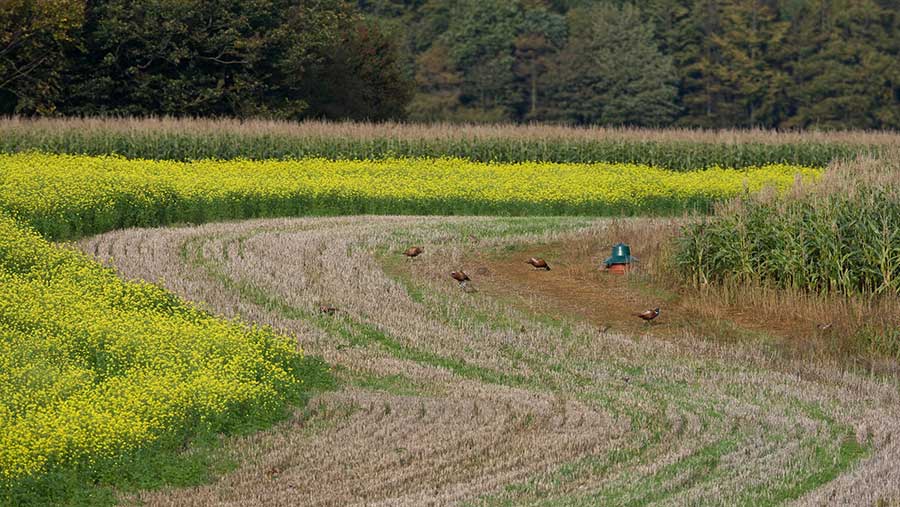Green charities sound alarm over SFI ‘lack of ambition’
 © Tim Scrivener
© Tim Scrivener Three leading UK environmental charities have accused Defra of failing to protect nature and wildlife in its new scheme for sustainable land management.
A “shocking lack of ambition” in the Sustainable Farming Incentive (SFI) scheme breaks Brexit promises and puts the government’s 25-year environment plan in jeopardy, said the Wildlife Trusts, the National Trust and the RSPB.
The charities accused the government of failing to come up with a proper plan to boost nature-friendly farming and address the native wildlife losses over the past three decades, stemming from modern agricultural policy and farming methods.
See also: SFI soil payment rates revealed but disappointment abounds
The charities said the SFI scheme – the first that every farmer can access in Defra’s new Environmental Land Management (ELM) policy – is at risk of creating a status quo by funding basic good practice, which in some cases will not require any extra benefits for nature.
From next year, farmers in England will initially be paid between £20 and £58/ha for basic measures to protect their soils, such as testing soil organic matter, producing a soil management plan and ensuring land is covered over winter through cover crops or weedy stubble.
Plans ‘fall short’
Hilary McGrady, director-general of the National Trust, said: “Nearly four years has passed since the government set out its vision for the future of food, farming and the environment in a ‘Green Brexit’… but the future of wildlife and climate now looks uncertain as today’s announcement falls short of the ambitious reforms promised.
“Farmers need a clear path to a future where nature is at the heart of sustainable and secure food production, not the short diversion this new scheme creates.”
Craig Bennett, chief executive of the Wildlife Trusts, added: “There’s so much that farmers could be rewarded for doing, such as restoring peatlands and employing ambitious measures to prevent soil and pollutants from washing into rivers – to help wildlife and store carbon.
“It’s an absolute scandal that the government has failed to seize this unique and important opportunity to improve farming so it can help restore nature and address the climate crisis.”
Further standards
Defra secretary George Eustice announced the measures for SFI at the Country Land and Business Association rural business conference in London on Thursday (2 December).
As the rollout progresses, the government will include further standards to deliver wider environmental outcomes, such as improving hedgerows and combining trees or shrubs with crop and livestock farming, Mr Eustice said.
He told delegates: “While it is not for me to tell an individual farmer what to do, I accept that we need to be clear about the policy outcomes we seek.
“These are to halt the decline in species abundance by 2030; to reduce our greenhouse gas emissions; to plant up to 10,000ha of trees per year in England; to improve water quality; to create more space for nature in the farmed landscape; and to ensure that we have a vibrant and profitable food and farming industry which supports the government’s levelling-up agenda and helps safeguard our food security.”
Farming groups give mixed reaction to SFI announcement
Farming and industry organisations have given a lukewarm reaction to Defra’s plans to roll out the Sustainable Farming Incentive (SFI) scheme in 2022 and beyond.
Some have welcomed the measures, but others say they lack ambition and do not incentivise farmers enough to improve nature and wildlife, while the payments barely cover the costs.
Here is how farming reacted:
“It is vital that the SFI recognises the significant costs farmers could incur in delivering public goods and fully recognises that in the payment rates, at a time when direct payments are phased out.”
Tom Bradshaw, vice-president, NFU
“The detail announced today of the Sustainable Farming Incentive, a key pillar of ELM, fires the starting gun on our transition towards a more sustainable and resilient farming sector, that will feed the nation as well as deliver further environmental benefit.”
Mark Tufnell, president, Country Land and Business Association
“This is not the scheme we were hoping for. SFI22 on Moorland is much lower in ambition and offer than we had expected.”
Julia Aglionby, executive director, Foundation for Common Land
“Many farmers are already delivering at the starting levels of the SFI and are going beyond it. Given that the measures on offer are minimum requirements we should already be delivering as part of standard practice, farmers can – and should – do better.”
Martin Lines, chairman, Nature Friendly Farming Network
“We need a far clearer vision of how ambition will be ratcheted up over the next three years for SFI and the Local Nature Recovery scheme. The ambition level of the SFI 2022 scheme is too low to expect any significant environmental gains.”
Vicki Hird, campaign co-ordinator, Sustain: the alliance for better food and farming
